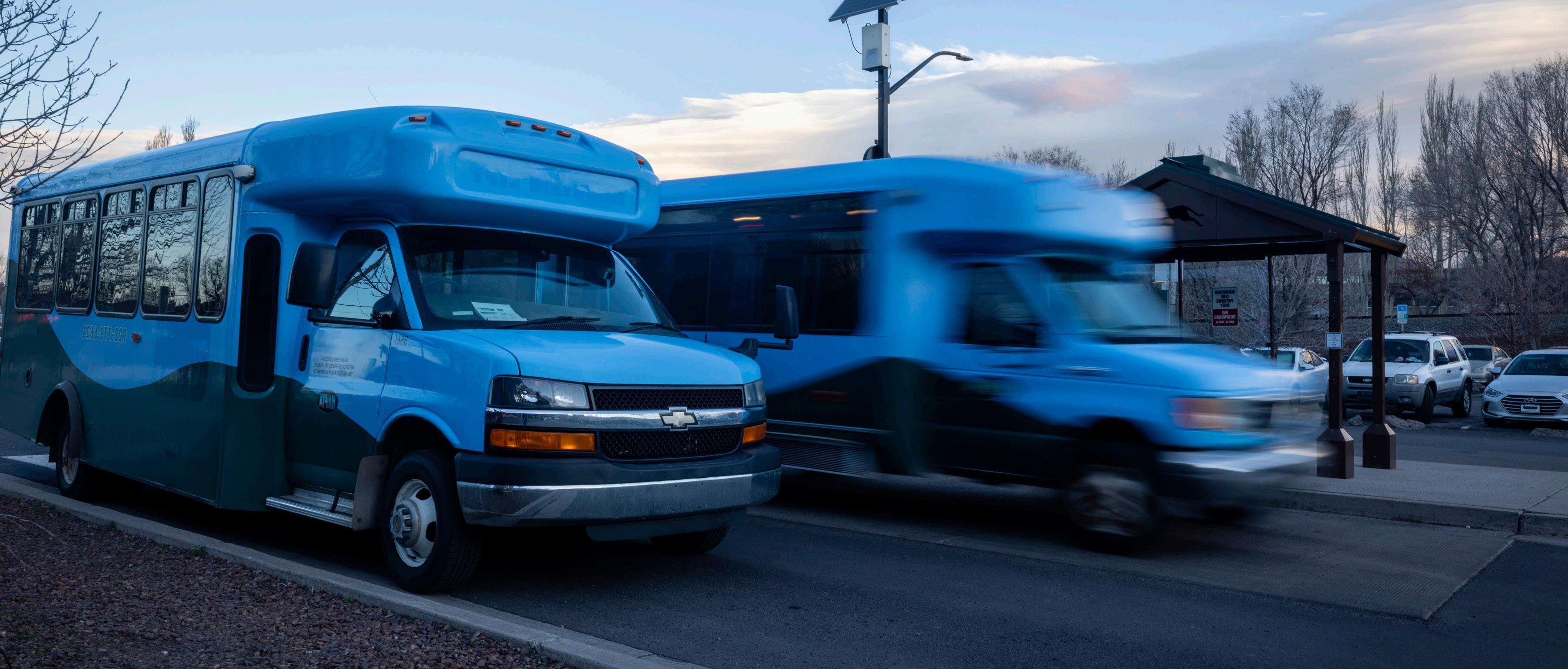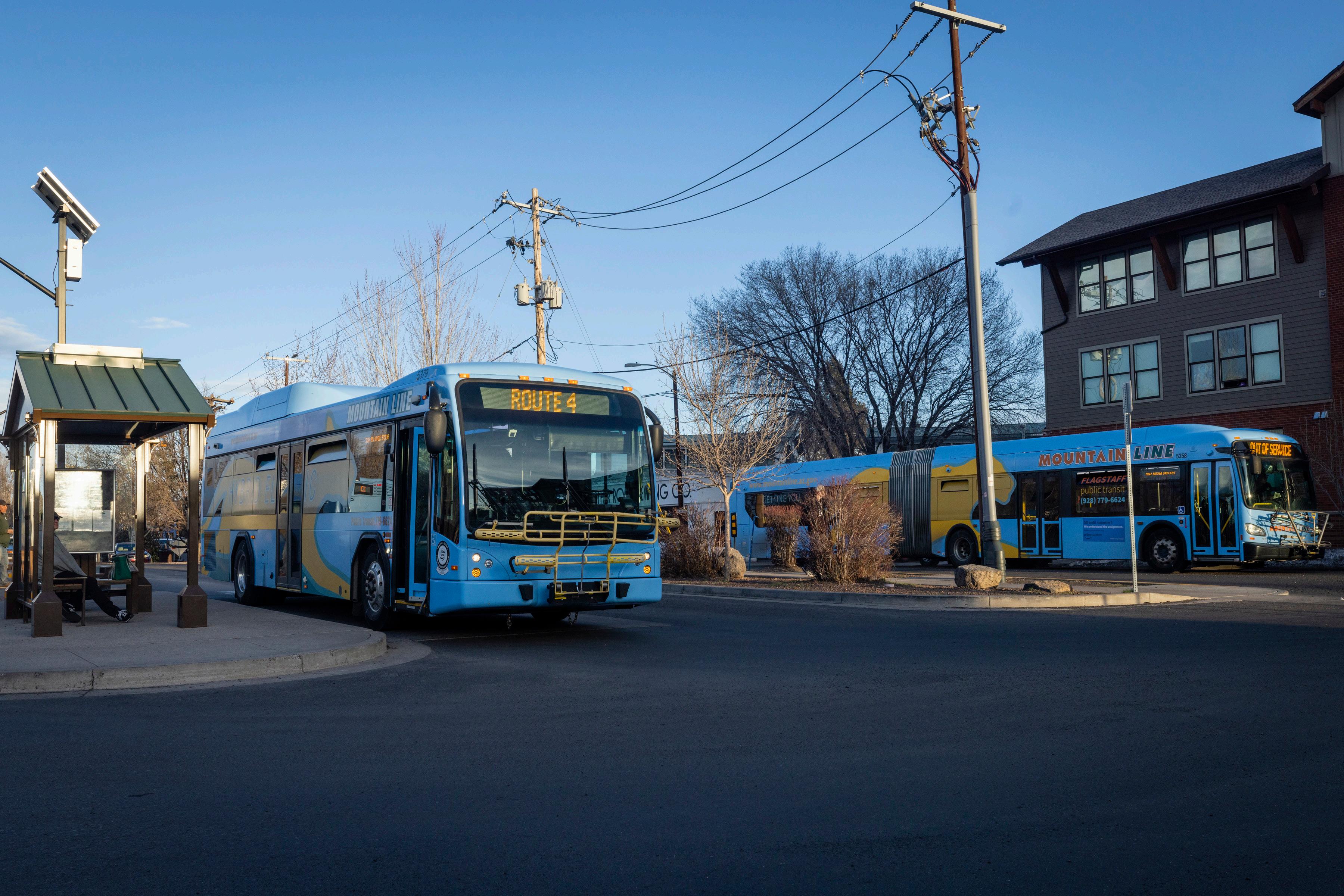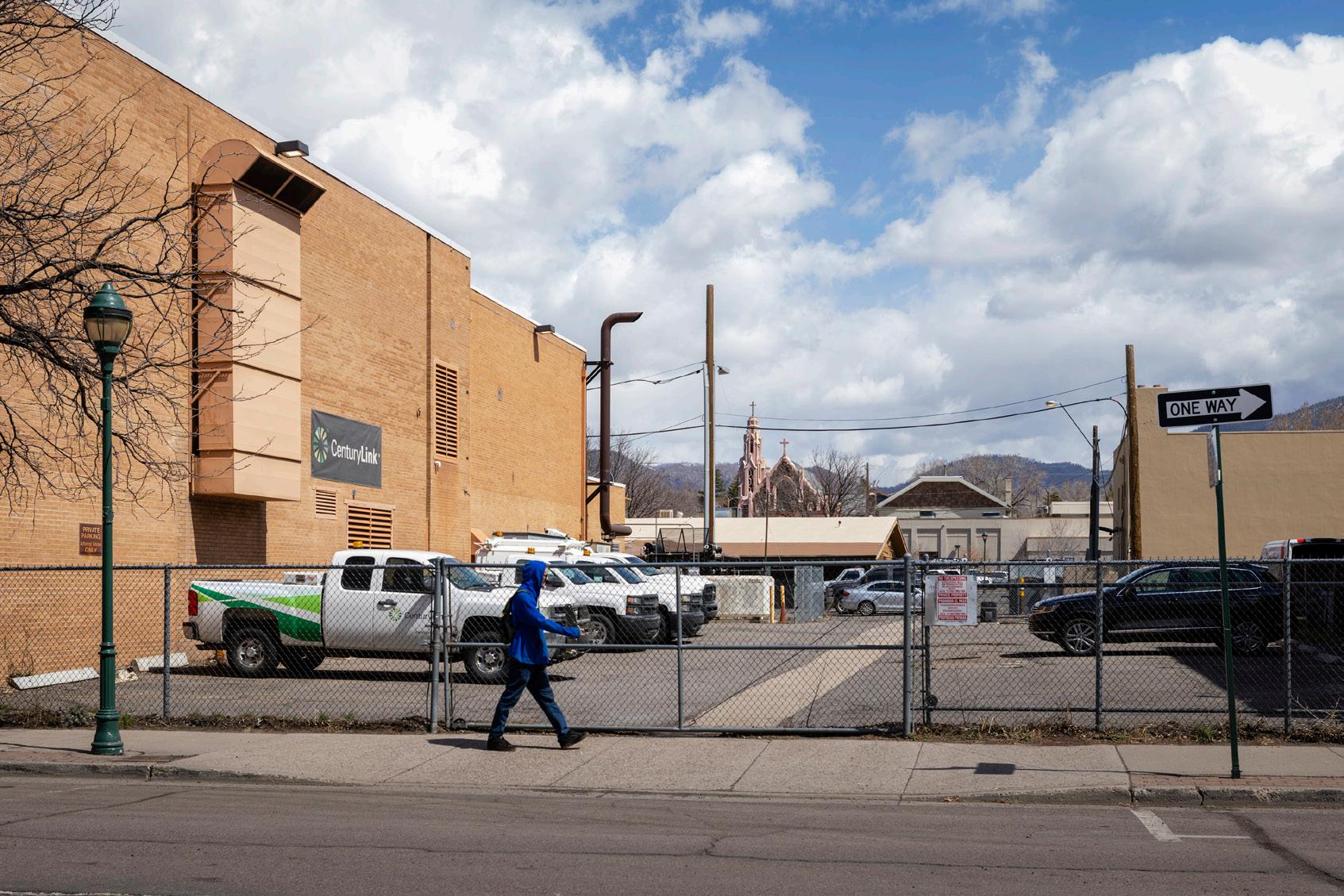
8 minute read
Flagstaff takes on construction development NAU works to mitigate tuition increases


ABIGAIL CELAYA
NAU is working to decrease the cost of tuition and keep college as affordable as possible by collaborating with students to determine price increases on campus. The efforts are in accordance with Article 11 of the Arizona Constitution which states that tuition should be kept at a low cost so education is accessible to as many students as possible.
Data on tuition costs show a previous 2-1 ratio in favor of the state’s university funding versus what students paid to attend. In 2017, the ratio reversed and the state paid less than half of what students paid.
The university has put a cap on tuition increases. For the next six years, students will not see more than a 3% tuition increase.
Those who enrolled during the time of the tuition pledge program specifically will not see an increase. The program, which had its last run this academic year, guaranteed enrolled students would not see a tuition increase during their first four years as an undergraduate. If first-time students enroll at NAU for fall 2023, they will not receive the tuition lock.

In place of the pledge program, the Access2Excellence program will start in the fall and guarantee free college for any students who come from a household with a combined income of $65,000 or less a year.
Senior and Student Body President Brendan Trachsel advocates for students when NAU determines the rate of housing, dining, tuition and fees. Public universities communicate with the Arizona Board of Regents (ABOR) to determine what students pay for the school year.
“I believe with my heart [NAU] is doing the best they can to reduce costs for students, but the fact of the matter is they are working within a greater system that just isn’t working for them,” Trachsel said. “So, until we see expanded significant state support, we aren’t going to see lower tuition for students.”
Tuition increases are primarily used to fund education and staffing.

“The increases that are being brought to students are simply paying for the bottom line,” Trachsel said. “We are not funding the wildest dreams of the university administration. We are paying for our education and the resources we get.”
Amanda Cornelius is associate vice president of enrollment management at NAU. She oversees the Office of Financial Aid, Enrollment Management Communications and the Jacks on Track Program Cornelius said NAU uses a lot of money to invest in employment, with approximately 60% of its expenses going toward staff. In January, faculty and staff received a 4.5% salary increase, which cost $14.5 million in recurring expenditures.
NAU offers a number of scholarships and has low student loan debt averages. Cornelius said she has seen
WATER ACCESS continued from FRONT
“It’s important to have that understanding that a place your family has been for generations is a place you don’t want to leave,” Janss said. “It’s also important for us to get water access to those people too, because it’s a human right.”
Janss said DigDeep is looking to expand NWP to additional communities across the Navajo Nation.
Black Mesa is home to a diverse system of aquifers used by locals to meet their water needs. This includes most of the Navajo aquifer, which stores drinking water and is used by Diné and Hopi communities.
Historically, coal plants have taken advantage of this aquifer and others like it. Tó Nizhóní Ání, a nonprofit which translates to “sacred the number of scholarships increase every year regardless of tuition increases. These scholarship opportunities come from new scholarship donors, along with new community organizations
“In the 2021-22 academic year, we disbursed over $20 million in scholarships, up over $400,000 from the previous year,” Cornelius said. “This does not include tuition waivers.”
Ninety-five percent of first-year students at NAU receive financial aid, leaving 5% of students to pay for college on their own, according to an NAU paying-for-college flyer.

“Each institution has its own needs and goals, but I
“IT’S IMPORTANT TO HAVE THAT UNDERSTANDING THAT A PLACE YOUR FAMILY HAS BEEN FOR GENERATIONS IS A PLACE YOU DON’T WANT TO LEAVE,” JANSS SAID. “IT’S ALSO IMPORTANT FOR US TO GET WATER ACCESS TO THOSE PEOPLE TOO, BECAUSE IT’S A HUMAN RIGHT.”
– Katie Janss, program operations manager for Navajo Water Project think NAU does a great job of keeping tuition as affordable as possible,” Cornelius said. “During the pandemic, tuition was not increased for three consecutive years. Any proposed increases are discussed and carefully weighed to best suit the needs of students, faculty and staff — the whole NAU community.” ensure water sources on Black Mesa are protected from industrial contamination and misuse.
Students can see what scholarships they are eligible for, how much federal aid they may receive and the number of federal loans they can take out by filling out the Free Application for Federal Student Aid (FAFSA).


In the ‘70s, the coal mining company Peabody Energy began operating the Black Mesa and Kayenta Mines. Both mines used high quantities of leased water from the Navajo aquifer to transport coal to the Mohave Power Station in Laughlin, Nevada and the Navajo Generating Station in Page, Arizona.
On average, the Black Mesa Mine required 1.3 billion gallons of water annually to function. In 2005, the mine permanently closed along with the Mohave Power Station. The Navajo Generating Station and Kayenta Mine later closed in 2019.
The mining operation had a lasting impact on the Navajo aquifer. According to the National Resources Defense Council, declines in the aquifer’s structural stability and water quality were amplified by the corporation’s 50 years of water use.
Illustrationbycalleighjuday
Nicole Horseherder, Diné, founder and executive director of Tó Nizhóní Ání, said this study sparked the nonprofit’s creation in 2000. Since then, Horseherder said she has worked to reclaim land ravaged by Peabody Energy operations.
“What that means for us is, in the lifetime of the coal mine, we had lost access to our drinking water,” Horseherder said. “It also brings up the issue that if we can’t do coal mining right in this country, we probably shouldn’t be doing it at all.”
Tó Nizhóní Ání advocates for the proper rehabilitation of water sources and former power plant sites that have been depleted by fossil fuels. This includes ensuring native plants used for medicinal and ceremonial purposes made obsolete by mining operations can flourish, an initiative Horseherder said she has yet to see from current reclamation efforts sponsored by mining corporations.
As a part of its Just and Equitable Transition campaign Tó Nizhóní Ání is focused on combating the economic losses inflicted by mine closures for Indigenous employees and the entire Navajo Nation. These efforts consist of advocating for renewable energy and offering re-training and jobs for displaced mine workers.
In total, Horseherder said Tó Nizhóní Ání strives to help individuals on and off reservations to understand the importance of fighting for a healthier ecological future before it is too late.
“We know very deeply how we are connected to water, the relationships we have with water and the fact that no life could exist without it,” Horseherder said. “By acting out and speaking out, we’re living in accordance with the principles we were given to live with, and that is to protect the water sources for the next generation.”
Women are breaking the glass ceiling of politics
The world of politics is ever-changing.
One of the primary movements seen in the past years is the involvement of women in politics, which has had a large impact on the political world. Political involvement is not exclusive to females that hold a place in office; it has reached women of all demographics.
Susan B. Anthony was a very influential person during the women’s suffrage movement and an advocate for women’s rights.
“In a true republic, men should have nothing more than their rights,” Anthony said. “And women? Nothing less.”
This was one of many speeches by Anthony, which helped pave the road to the 19th Amendment, giving women in the United States the right to vote.
According to a 2020 U.S. Census report, 68% of eligible women reported voting, compared to a 65% turnout for men. In the 2016 election, 63% of women and 59% of men reported voting.

One century ago, women were not allowed to vote, and the entire demographic was left out of political decision-making. I can’t help but wonder what women of the 1920s would think if they could see how far women have come. Once upon a time, the idea of women having a voice was just a dream, but due to perseverance and hard work, when women scream, they are heard.
The presence of women in leadership roles is a great asset because of their capability to provide different skills and imaginative perspectives. For example, a national survey by the Pew Research Center Social and Demographic Trends survey ranked 2,250 adult women better than or equal to men in seven of the eight primary leadership traits assessed throughout the survey.
UN Women Executive Director Phumzile MlamboNgcuka has been an advocate for diversity and inclusion, specifically when it comes to gender.
“No country prospers without the engagement of women,” Phumzile Mlambo-Ngcuka said. “We need women’s representation that reflects all women and girls in all their diversity and abilities and across all cultural, social, economic and political situations.”
Women are changing the face of politics in revolutionary ways. Since the beginning of U.S. politics, the presidential race has been a popularity contest between two white men.
Women in power are building a different world where everyone has a role and it is respected — they are fighting for equality, integrity and respect. This is because women have lived in deprivation of rights and dealt with the consequences. Women fight every day to ensure change and make sure deprivation of rights are no longer present in young girls’ lives, paving the way for the future female figures.
Shannon O’Connell, the director of programmes at Westminster Foundation for Democracy, has expressed concern on various occasions regarding the treatment of different genders in politics.

“Understanding the gendered nature of political leadership and decision-making is more important than ever as we collectively rebuild and hopefully move toward a more sustainable, resilient and inclusive future,” O’Connell said In the past decade, women have rebuilt the political world to begin the construction of the future. In 2020, the U.S. elected the first female vice president, shattering the gender barrier in the White House.
Other actions taking place in Congress are the presence of Reps. Ilhan Omar of Minnesota, Alexandria Ocasio-Cortez of New York, Rashida Tlaib of Michigan and Ayanna Pressley of Massachusetts, also known as “The Squad.” All four are democratic women of color looking to make systematic change.
Since taking office, Ocasio-Cortez has been busy creating major change, co-sponsoring the Green New Deal, advocating for the U.S. economy to combat climate change, Medicare for All and free public college.
Omar’s election made her the first Somali-American and the first naturalized citizen from Africa in Congress, bringing a more diverse background to encourage new ideas. Her victory spurred the House to end its 181-year ban on headwear, and Omar became the first woman to wear a hijab on the House floor.
In Congress, Pressley has been an advocate for survivors of sexual assault, arguing for better protections for victims and a staunch supporter of abortion rights. Pressley’s first amendment on the House floor called for lowering the voting age from 18 to 16, but it did not pass. Her ideas are centered around female reproductive rights and have created a new feminist perspective in politics.
Tlaib is the first Palestinian-American woman in Congress. She has proposed legislation to expand federal civil rights laws, marched against police brutality and decried the impact of corporate money on politics. She holds very strong ideas about the former president. Donald Trump, and after this led to controversy on Twitter after sharing her opinion, her popularity has risen.










